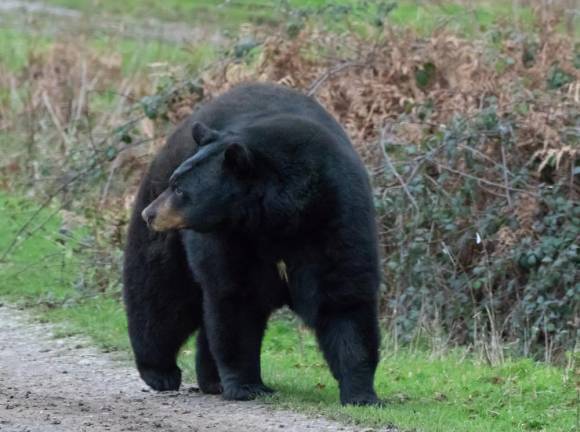UPDATED: Black bear hunt extended
NEW JERSEY. The state’s goal is a harvest rate of 20 percent. So far, the rate is 17.8 percent.

The black bear hunting season was extended by four days this week, the New Jersey Division of Fish and Wildlife said Monday, Dec. 11.
The extension was scheduled to begin Wednesday, Dec. 13 and to end Saturday, Dec. 16. Hunting hours are a half-hour before sunrise to a half-hour after sunset. Zone permits are available.
Ten bears were killed Wednesday and Thursday, four in Warren County, three in Sussex, two in Passaic and one in Morris.
The state’s black bear hunt reopened Dec. 4 for the second of two parts.
From Dec. 4 through Dec. 9, 137 bears were killed, including 86 in Sussex, 23 in Warren, 15 in Morris and 13 in Passaic.
Hunters killed 331 bears in the first segment of the bear hunting season in October. Twenty-two of that total were tagged for a cumulative harvest rate of 13.5 percent.
Seven more tagged bears were killed last week, raising the harvest rate of 17.8 percent. None of the bears killed this week were tagged.
The state’s goal is a harvest rate of 20 percent.
Wildlife biologists affix tags to bears when one is handled for research purposes or is captured in response to a nuisance complaint.
Extension ‘unneeded’
The New Jersey Sierra Club opposes the bear hunt and the extension and has urged the Murphy administration to adopt a non-lethal bear management plan.
“Unnecessary bear hunts that do not solve anything have been a systemic problem in New Jersey throughout multiple administrations. Enough already. The New Jersey bear hunt extension is completely unneeded,” said Anjuli Ramos-Busot, state director of the Sierra Club.
“So far, 468 bears have been killed because Governor Murphy failed to keep his word to end the bear hunt. If the New Jersey Fish and Wildlife really care about protecting public safety, they need to adopt a real management plan that deals with protection of habitats, garbage and educating people in bear country.”
For example, a bill that would amend the law on the feeding of black bears, S1891(Johnson)/A1967(Mukherji), that was released recently from the Senate Economic Growth Committee “is a step in the right direction when it comes to tackling unintentional feeding or attracting bears,” Ramos-Busot said.
“It’s a matter of how we will co-exist with bears. Without proactive non-lethal management, human-bear conflicts will continue to increase, and bears will continue to pay the price.”
Rules of the hunt
Segment B of the hunt earlier was scheduled through Saturday, Dec. 9 for shotguns and muzzleloaders only.
Only those with a valid permit for Segment B who did not harvest a bear during the regular part of that segment may hunt during the Segment B extension.
Black bear hunting is permitted only in zones 1-5, which include parts of Sussex, Morris, Passaic, Warren, Hunterdon, Bergen, Mercer and Somerset counties.
According to rules adopted by the state Department of Environmental Protection on Oct. 2:
• Hunters may not attempt to take or kill a black bear weighing less than 75 pounds (live weight), or less than 50 pounds dressed.
• Hunters may not attempt to take or kill an adult black bear that is in the presence of cub(s) (bears weighing less than 75 pounds).
• Hunters may not attempt to take or kill a black bear or have a loaded weapon within 300 feet of a baited area when hunting bears.
Black bear permits are valid only for a specific zone. Hunters may have up to two permits, each for a different zone, but may harvest only one bear per segment no matter how many permits they have.
If no bear is taken during Segment A, the permit is valid for hunting in Segment B. If a hunter harvests a bear during Segment A, that permit is no longer valid; the hunter may purchase a permit for that same zone to use during Segment B.
Apprentice license holders are not eligible to hunt black bear.
Hunters must check all bears harvested at a mandatory bear check station. Check stations will be open from noon to 7 p.m. in Segment B.
When field dressing a black bear, hunters must leave the sex organs intact, attached to the body. A harvested black bear may be quartered and brought out of the field in sections.